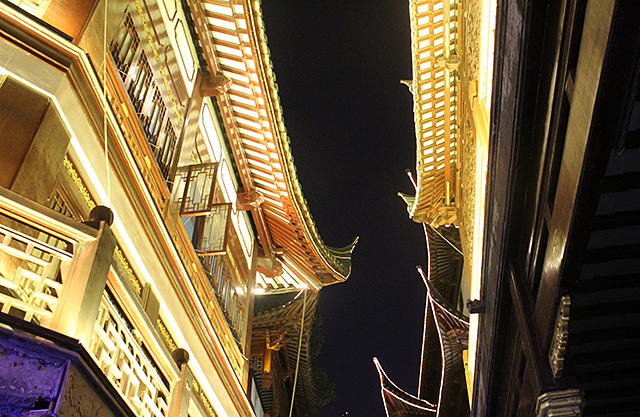Three Events Coincide:
Shanghai Communiqué,
Zhou Enlai Anniversary,
Beijing Winter Olympics
March 2022
The Zhou Enlai Peace Institute
Honolulu and Beijing
Three events in the relationship of China with the world were recently celebrated. They intersect in profound and fascinating ways:
• The 50th Anniversary of the signing of the Shanghai Communiqué, by U.S. President Richard Nixon, and by Chinese Premier Zhou Enlai, on February 28, 1972; marking the the beginning of transformation of China’s relationship with the world; in Shanghai, Jinjiang Hotel
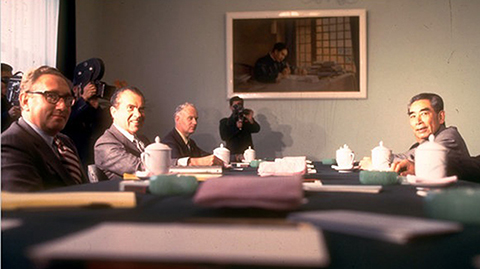
After a hard day’s work in Shanghai, crafting the Communique: Kissinger, Nixon, Rogers, Zhou Enlai.
• The 124th Anniversary of the birth of Zhou Enlai, author of the Five Principles of Peace and the first Premier and Foreign Minister of modern China; in Huaian, Jiangsu Province
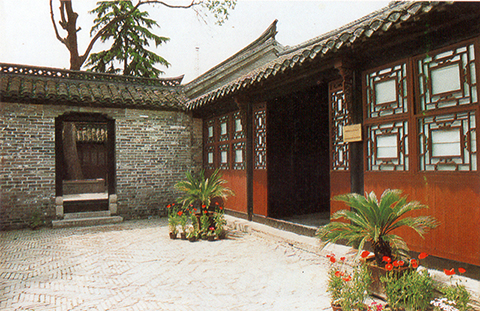
The ancestral home of the Zhou family, in historic Huaian.
• The 2022 Beijing Winter Olympics hosted by China; smoothly bringing together athletes from 91 nations to celebrate excellence and observe international peace; in Beijing and across the northern provinces of China
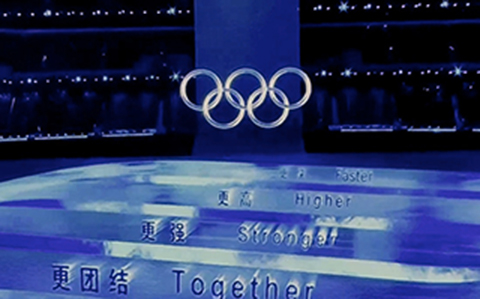
A scene from the closing ceremony of the Beijing Winter Olympics, 2022.
1. The Shanghai Communiqué was a masterpiece of subtle diplomacy, achieved at a time when the United States and China had not had formal diplomatic relations for 25 years. Their ideological and political differences seemed hopelessly extreme.
Yet, in just a week of intense discussion, travel, social and cultural events, the Shanghai Communiqué was signed, and it electrified the world: the prospect of the two great peoples working together to resolve their differences through purely peaceful, diplomatic means.
It runs just a little over three pages. Much meaning, few words.
The Communiqué is notable for what it says — and also for what it does not say:
It says that America and China have principled differences in many areas, which are unlikely to be quickly resolved.
It says that the two nations nonetheless share common interests, priorities and history, and that those priorities form the foundation for future international cooperation in economic, political and military spheres. It defines a few modest initial steps to be taken on that path.
So the Communiqué brings together two styles of thinking: tight pragmatism and visionary idealism. It maps both differences and convergences, and does not attempt too much, all at once.
The Shanghai Communiqué served as the basis for building bilateral ties over the next seven years, culminating in the beginning of diplomatic relations in 1979, signed by leader Deng Xiaoping and President Carter — ending 40 years of difficult and dangerous isolation for both nations.
Generations of transformation, positively affecting billions of lives over generations — all begun in a few intense days in 1972.
From modest beginnings — great achievements.
The Shanghai Communiqué was made possible chiefly by the diplomatic dexterity of two men: Premier Zhou Enlai and National Security Advisor Henry Kissinger. Their friendship, built on simple, human interactions and the sharing of a friendly drink, was the rock on which peace rested.
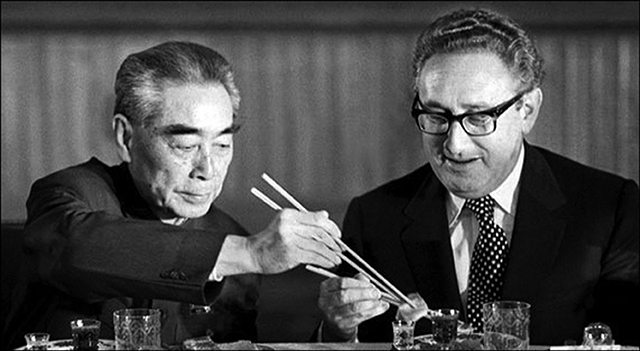
Zhou Enlai and Henry Kissinger building friendship, learniing how to use chopsticks in Shanghai.
The original, complete text of the Shanghai Communique: read here (pdf)
2. Zhou Enlai was born in pre-Revolutionary China in 1898, and in his idealistic youth, at age 12, he won a national essay contest with the words:
I dedicate my life to the rise of China.
At age 18, he wrote a poem from Nankai Middle School in Tianjin that is still celebrated across China:
In order to find ways to rescue the troubled world,
I don’t mind facing a wall for ten years;
Someday, I hope to break that wall.
He became Premier and Foreign Minister on China’s birthday, October 1, 1949. His birthday, marked nationwide in China on March 5, coincides with the annual meetings in Beijing at the Great Hall of the People, in which forward policies are debated and declared.
The roots of the Shanghai Communiqué are profound, and are owed in part to Henry Kissinger, the lifelong student of diplomacy, born in Germany in 1923. Of his encounters with Zhou Enlai leading up to the Communiqué, Kissinger recently said, in an interview with former Ambassador to the US Cui Tiankai:
The method of diplomacy that we encountered was one of meticulous politeness and conceptual conversations… Premier Zhou Enlai wanted to talk exclusively about long-term issues…that we should deal with other on the basis of mutual respect.
It is useful to see the original Shanghai document; it is available here. It reiterates the Five Principles of Peace, first written in 1954 by Zhou Enlai:
… the two sides agreed that countries, regardless of their social systems, should conduct their relations on the principles of respect for the sovereignty and territorial integrity of all states, non-aggression against other states, non-interference in the internal affairs of other states, equality and mutual benefit, and peaceful coexistence.
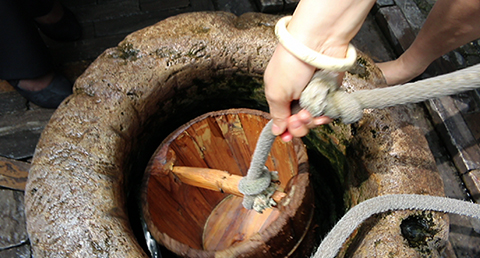
Bringing fresh water from the family well, at the center of the Zhou Family residence in Huaian. Maintained today as it was in 1898.
3. Beijing Winter Olympics: The promise of 1898 in Huaian, and the vision of 1972 in Shanghai, were fulfilled in Beijing in 2022.
By opening the Beijing Winter Olympics, President Xi Jinping of China drew on the work of previous generations, as he endorsed the principles of the Games:
Together
Stronger
Higher
Faster
And the words of the theme song:
Together we share joy
And we share sorrow
Together we strive, together we dream…
Let us pray with sincerity
To wish for peace and happiness
For two weeks, the athletes of the 24th Winter Olympiad observed the call for a global truce, issued by International Olympic Committee President Thomas Bach. He said,
In our fragile world, where division, conflict and mistrust are on the rise, we show the world: yes, it is possible to be fierce rivals, while at the same time living peacefully and respectfully together.
Young people from nations preparing at that moment for possible conflict nonetheless competed in Beijing in a friendly, positive atmosphere. Consistent with the spirit of Zhou Enlai and the Shanghai Communiqué.
Enduring at the center: stillness, compassion, acceptance.
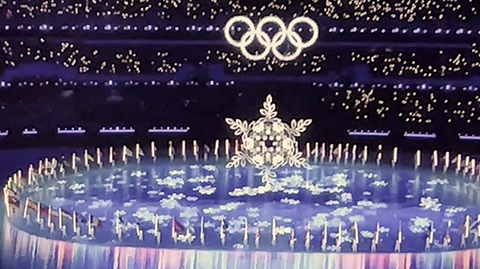
Flags of the Olympic Nations and the universal snowflake theme, representing the uniqueness of each country.
Conclusion
In March, 2022 — the clouds of war roll today across the world. It is time to recall the achievements of these heroes of peace from a previous generation.
Today, the people of the world yearn for leadership of the character shown by Zhou Enlai and Henry Kissinger. These pioneers took great risks in advocating for peace, and through an artful combination of pragmatism and vision, their goals were ultimately achieved.
Who will rise now, to carry their legacy forward?
Michael North and
Xiaofang Zhou North
co-founders, Zhou Enlai Peace Institute; © copyright 2022
Chinese translation by Lu Jingli
